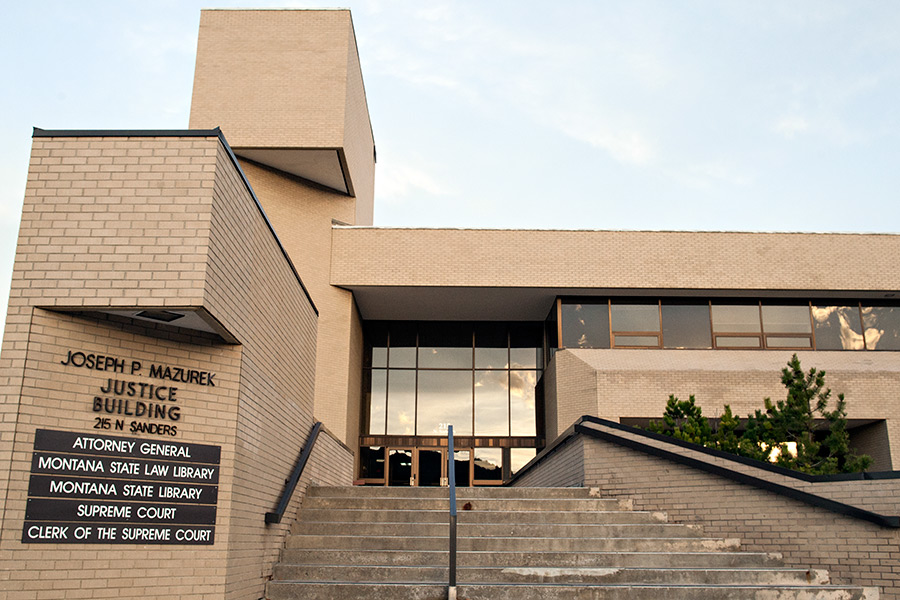Court Administrator Says Legislature ‘Misstates the Facts, Cries Foul’
In a brief discouraging SCOTUS from taking up the case, Court Administrator Beth McLaughlin spars with the Legislature over Montana Supreme Court dispute
By Mara Silvers, Montana Free Press
HELENA — Attorneys for Montana Court Administrator Beth McLaughlin urged the U.S. Supreme Court Wednesday not to take up the legal case spawned from the nearly year-long dispute between the Republican-led state Legislature and the Montana Supreme Court.
In a 40-page brief, McLaughlin attorney Randy Cox rebutted arguments presented by plaintiffs in December alleging that the state Supreme Court infringed on the Legislature’s federal right to due process when its justices declined to recuse themselves from the case, which regards legislative subpoena powers.
McLaughlin’s brief also sought to correct what it said were state attorneys’ factual misrepresentations of the sprawling legal back-and-forth, including the Legislature’s claim that Montana’s Supreme Court justices quashed subpoenas issued to individual justices by Republican majority leaders.
“Now, seeking review before this Court, the Legislature misstates the facts, cries foul, and claims the entire Montana Supreme Court should have recused itself from adjudicating McLaughlin’s challenge,” Wednesday’s brief stated. “The Legislature’s attempt to rewrite the history of this litigation and the issues presented to obtain review should be rejected.”
A press secretary for Montana Attorney General Austin Knudsen, whose office represents the Legislature in the case, declined to comment on McLaughlin’s brief Wednesday afternoon, directing a reporter to previous filings.
The protracted political feud between the two branches began last spring when Republican leaders in the Legislature accused the judicial branch of misconduct for polling district court judges on pending bills that would have affected the judiciary. Chief Justice Mike McGrath has repeatedly defended the routine polling of lower court judges as the judiciary’s only method for educating the Legislature about the branch’s function.
In its original request that the nation’s highest court review the interbranch dispute, the Legislature accused the Montana Supreme Court of “judicial self-dealing” because justices declined to step down from a case involving legislative subpoenas issued to the judicial branch. The Montana court in July struck down the Legislature’s subpoenas entirely, finding that they were overbroad and not related to a legitimate legislative interest.
In a flurry of subpoenas for judicial branch documents issued last spring, sent first to the agency that manages state email systems and later to McLaughlin, Republican lawmakers sought a swath of emails and documents from all seven Montana Supreme Court justices. The court in April temporarily stayed those subpoenas, citing the ongoing case filed by McLaughlin about the scope of legislative subpoena powers. Justice Jim Rice later recused himself from the ongoing case and took his subpoena to be evaluated in district court, where a judge later ruled the subpoena was invalid.
Following the decision to stay its subpoenas, the Legislature moved for the remaining justices to recuse themselves from the case, alleging a “bewilderingly obvious conflict of interest.” The Supreme Court repeatedly rejected the recusal motion in the following months, characterizing the blanket attempt at judicial recusal as a “unilateral attempt to manufacture a conflict” with the state Supreme Court.
McLaughlin’s brief to the U.S. Supreme Court on Wednesday rehashed those court proceedings and many others in the complex political saga, seeking to convince the high court that the Montana dispute is not a federal issue. The administrator’s filing also objected to the Legislature’s due process arguments, saying that the Fourteenth Amendment of the U.S. Constitution explicitly applies to individuals, not the government.
“As a co-equal branch of the State of Montana and an entity that acts under the authority of the State, the Legislature is not a “person” entitled to seek due process protection from this Court, much less wield the Fourteenth Amendment as a political weapon against another branch of government,” McLaughlin’s brief said.
Attorneys for McLaughlin further said that the Legislature’s brief does not meet the U.S. Supreme Court’s standard for review. The brief also pointed to the Legislature’s eventual decision to withdraw its judicial subpoenas last June as evidence that its current complaints are irrelevant.
“In the final analysis, the Legislature’s petition is heavy on rhetoric but light on factual and legal support,” Cox wrote, adding a quote from a poem from the late 1800s: “‘[T]he air is shattered by the force of [its] blow.’”
This story originally appeared in the Montana Free Press, which can be found online at montanafreepress.org.